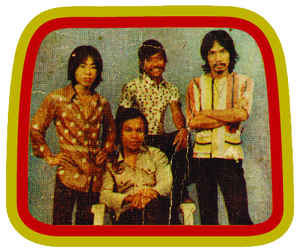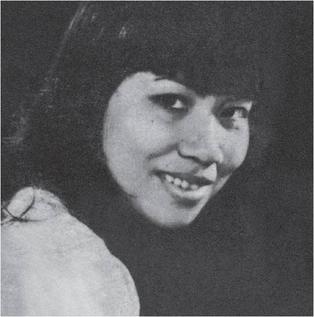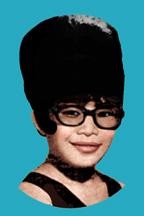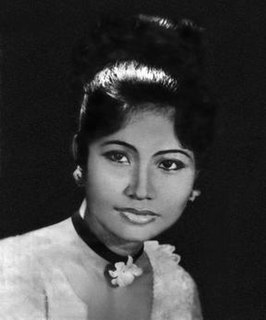 W
WDrakkar was a Cambodian hard rock band active in the late 1960s and early 1970s. Their music has been noted as an important late-stage development in Cambodian rock of the 1960s and 70s, a thriving music scene that was abruptly crushed by the Khmer Rouge communists in 1975. Some members of the band did not survive the ensuing Cambodian genocide. The band has gone through multiple lineups, with singer/guitarist Touch Seang Tana the only consistent member.
 W
WMeas Samon was a Cambodian singer and comedian, active in that country's psychedelic rock scene of the late 1960s and early 1970s.
 W
WHuoy Meas was a Cambodian singer and radio announcer in the 1960s and early 1970s. She was born in Svay Por Commune, Sangker District, Battambang Province, Cambodia. She also acted as a judge in the formal public song contest Samach Cheat, which was established by Head of State Norodom Sihanouk.
 W
WPou Vannary was a Cambodian singer active in the early 1970s. She was one of many Cambodian musicians believed to have perished during the Khmer Rouge regime starting in 1975.
 W
WPen Ran, also commonly known as Pan Ron in some Romanized sources intended for English-speaking audiences, was a Cambodian singer and songwriter who was at the height of her popularity in the 1960s and early 1970s. Known particularly for her western rock and soul influences, flirtatious dancing, and risque lyrics, Pen Ran has been described by the New York Times as a "worldly, wise-cracking foil" to the more restrained Cambodian pop singers of her era. She disappeared during the Khmer Rouge genocide and her exact fate is unknown.
 W
WMao Sareth was a Cambodian singer active from the early 1960s to the mid-1970s. Sareth was born in 1944 in Battambang, with the birth name Pol Sarann. She was one of the earliest popular singers in the Cambodian rock scene of the early 1960s, in which musicians combined traditional Khmer music styles with popular forms from the United States, Europe, and Latin America. Mao was cited as an influence by later singers Pen Ran and Ros Serey Sothea. She is known to have performed live as late as 1973.
 W
WRos Serey Sothea was a Cambodian singer. She was active during the final years of the Sangkum Reastr Niyum period and into the Khmer Republic period. She sang in a variety of genres; romantic ballads emerged as her most popular works. Despite a relatively brief career she is credited with singing hundreds of songs. She also ventured into acting, starring in a few films. Details of her life are relatively scarce. She disappeared during the Khmer Rouge regime of the late 1970s but the circumstances of her fate remain a mystery. Norodom Sihanouk granted Sothea the honorary title "Queen with the Golden Voice."
 W
WSinn Sisamouth was an influential and highly prolific Cambodian singer-songwriter from the 1950s to the 1970s.
 W
WSisowath Sirik Matak was a member of the Cambodian royal family, under the House of Sisowath.
 W
WPaul Tep Im Sotha Samath was a Cambodian Roman Catholic priest and the first apostolic prefect of Battambang. Ordained in 1959, he was the second native Cambodian to become a Catholic priest after Simon Chhem Yen.
 W
WKhun Srun was an important Cambodian writer. He was born in Char village (ភូមិចារ), Rorvieng sub-district (ឃុំរវៀង), Samrong district (ស្រុកសំរោង), Takéo province, into a poor Chinese Cambodian family. When he was eight, his father, Khun Kim Chheng, a Chinese man who had fled Communism, died, and he and his six siblings were raised by his mother, Chi Eng, a small shopkeeper and a devout Buddhist. He began his schooling during the country's first years of independence, when the doors to higher education and professionalization were inching open to all Cambodians, regardless of their social and economic class. A brilliant student, he studied Khmer literature and psychology at the university in Phnom Penh, becoming widely read in the sciences, mathematics, and European literature. Amid the turmoil of the 1960s, he worked as a professor of mathematics and a journalist while writing fiction and poetry. He also worked as a member of the textbook editorial committee at the Ministry of Education. In less than four years, he published three collections of poems, short tales, and philosophical anecdotes; two collections of autobiographical short stories, The Last Residence and The Accused; and a final volume of poems, For a Woman. He was influenced by both existentialism and Cambodian Buddhism. In 1971, he was imprisoned during 7 months by the right-wing Lon Nol government for refusing to collaborate, but still refused to align himself with the extreme left. In 1973, after being imprisoned for a second time, he finally joined the communist guerrillas. He was only 28, and his life as a writer was finished. After the Khmer Rouge took power, in 1975, Khun Srun was assigned work as a railway engineer). On the 20th of December 1978, he, his wife and their two youngest children were victims of the last purges. They were arrested, transferred to Tuol Sleng prison and probably killed in Choeung Ek, few days before the end of Pol Pot's regime. Only Khun Srun's nine-year-old daughter, Khun Khem, survived, taken by the Khmer Rouge and forced to live among them in the forest on the Cambodian-Thai border.
 W
WVorn Vet born Sok Thuok, was a Cambodian politician who served as deputy prime minister for the economy of Democratic Kampuchea. He was murdered at the S-21 security camp in 1978.
 W
WYol Aularong was a Cambodian garage rock musician, and a leading figure in that country's rock scene of the 1960s and 70s. He is presumed to have been killed during the Cambodian genocide that took place under the Khmer Rouge between 1975 and 1979.